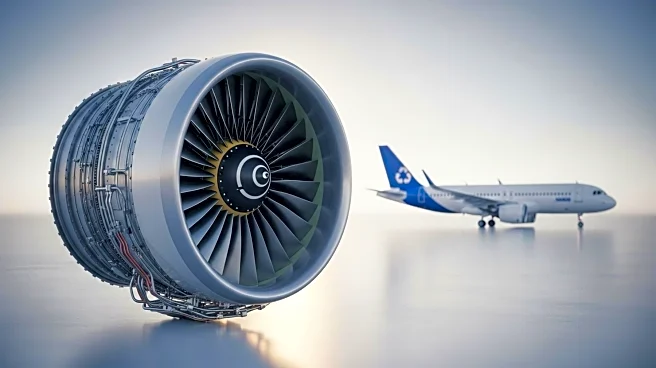What's Happening?
AerFin, a parts trading specialist, has dismantled and recycled four Airbus A320neo aircraft, previously operated by Indian carrier Go First, through French company Tarmac Aerosave. Despite the A320neo family's average age of just 3.76 years, these early teardowns are driven by accelerated engine inspections and upgrades. The Fleet Discovery database from Aviation Week Network lists 14 A320neo family aircraft as retired, primarily from Go First or IndiGo. Go First grounded its fleet in May 2023 due to unreliable Pratt & Whitney geared turbofan engines, leading to a legal standoff with lessors over aircraft maintenance. The part-out process began in June 2025, with each aircraft yielding 1,400 parts, including landing gear, engines, and auxiliary power units. Tarmac Aerosave has recycled over 430 aircraft, achieving a 92% parts recovery rate.
Why It's Important?
The recycling of these A320neo aircraft highlights significant issues with Pratt & Whitney's geared turbofan engines, impacting airline operations and leading to early aircraft retirements. This situation underscores the importance of reliable engine performance in the aviation industry, affecting operational costs and fleet management strategies. The dismantling and recycling process also reflects the growing trend towards sustainable practices in aviation, as companies seek to maximize parts recovery and minimize waste. AerFin's actions may influence other airlines and lessors to consider similar strategies for managing aging fleets and addressing engine reliability concerns.
What's Next?
AerFin plans to disassemble another Pratt GTF-powered A320neo in Asia, targeting the local market for parts supply. This move indicates a continued focus on recycling and parts trading, potentially expanding AerFin's operations in the region. The ongoing issues with Pratt & Whitney engines may prompt further legal and operational challenges for airlines, as they navigate maintenance and fleet management decisions. Stakeholders in the aviation industry, including manufacturers and airlines, may need to address these reliability concerns to prevent further disruptions and ensure sustainable fleet operations.
Beyond the Headlines
The early retirement and recycling of A320neo aircraft could signal a shift in the aviation industry's approach to fleet management, emphasizing sustainability and resource optimization. This development may encourage manufacturers to enhance engine reliability and performance, reducing the environmental impact of aircraft operations. Additionally, the legal disputes between airlines and lessors over maintenance responsibilities highlight the complexities of aircraft leasing agreements, potentially leading to changes in contract terms and industry standards.









